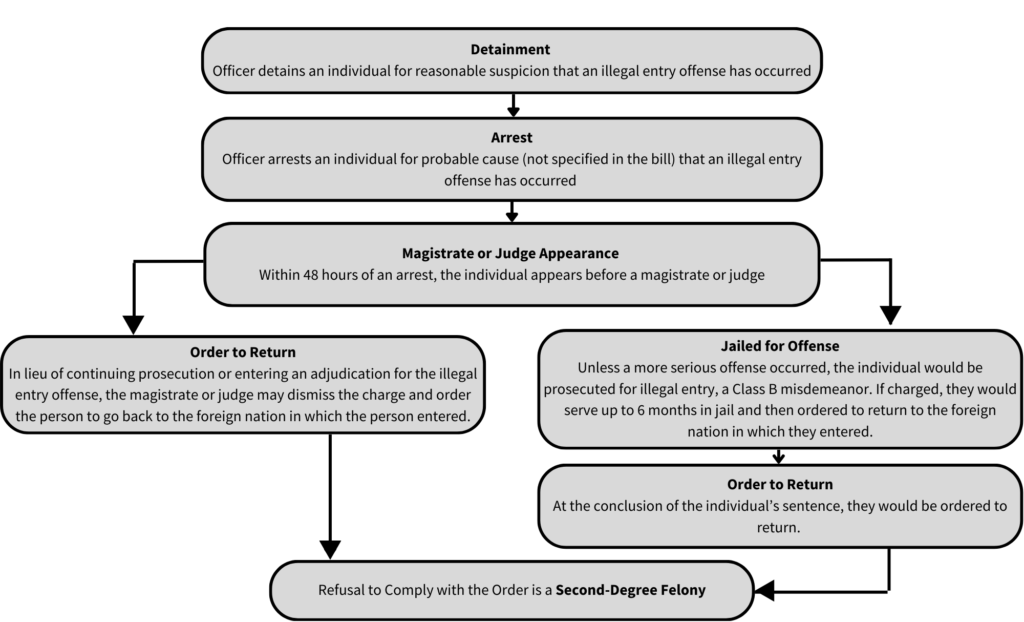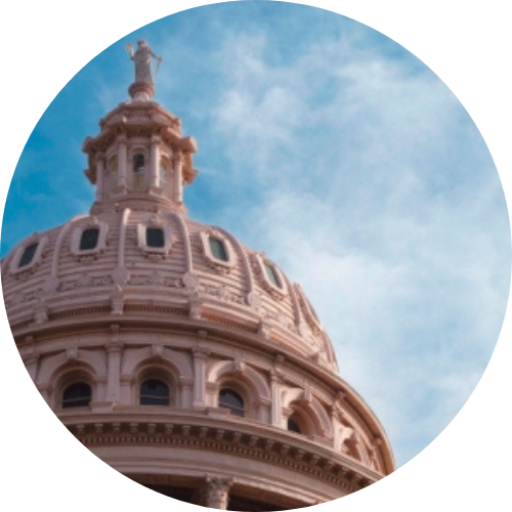The third and fourth special sessions have ended without passing vouchers and without additional funding for schools. While the former is cause for celebration, it is deplorable that the Governor continues to hold school funding and teacher pay hostage in his political games. Besides a significant cost to the taxpayer, these latest specials have only resulted in anti-immigrant legislation and vaccine mandate bans that are neither an emergency nor a service to Texas families.
This report offers a look at the bills that passed during the third and fourth specials.
Third Special Session Bills Signed by the Governor
Enhancing penalties for smuggling-related offenses
SB 4, 88(3)
Currently, a smuggling offense can be tried as a first, second, or third-degree felony carrying prison terms from two to five years on the low end and 10 to 99 years on the high end. SB 4 establishes a 10-year mandatory minimum for smuggling and continuous smuggling. The minimum sentence can be lowered to 5 years for “significant cooperation” with law enforcement.
SB 4 also creates penalty enhancements for several offenses if committed together with the operation of a stash house or smuggling of persons. It establishes a third-degree felony charge with a minimum of 5 years of prison if, during the commission of operating a stash house, the property subject to the offense is used to commit or facilitate kidnapping, smuggling, trafficking, prostitution, or a person was a victim of sexual assault, aggravated sexual assault, serious bodily injury, or death. Currently, the operation of a stash house is punishable by up to one year in jail. Additionally, SB 4 enhances penalties to a third-degree felony for trespassing, burglary, and evading arrest if the smuggling of persons occurred at the commission of the original offense.
SB 4 authorizes increasing the penalty for smuggling, continuous smuggling, and operating a stash house to the next higher category if committed in a declared disaster area, with a minimum term of 15 years.
Mandatory minimums lack the judicial discretion necessary for fair sentencing which may lead to overly harsh penalties that are not in the interest of justice. Additionally, there is little evidence that mandatory minimums effectively deter crime. Even serious violent crimes, like murder, don’t have mandatory minimum sentences in Texas. Texas smuggling laws are already overly broad, potentially criminalizing everyday activities. SB 4 further penalizes this already broad offense.
Prohibiting Private Employers from Enforcing COVID- 19 Vaccine Mandates
SB 7, 88(3)
SB 7 authorizes the Texas Workforce Commission (TWC) to fine private employers $50,000 for taking “adverse action” against employees who refuse to be vaccinated against COVID-19, defined as punishing, alienating, or otherwise adversely affecting an employee.
An exception is granted to health care facilities, providers, and physicians, allowing the establishment of reasonable policies, such as using protective medical equipment for unvaccinated employees. Exempt facilities include public and private hospitals, physicians’ offices, nursing facilities, hospice care facilities, and assisted living facilities.
It is unlikely that SB 7 will change existing practice by private employers who are already obligated by Title VII and the Americans with Disabilities Act (ADA) to provide reasonable accommodations for employees unvaccinated due to disability or sincerely held religious beliefs. Hospitals also offer medical or religious exemptions.
Instead SB 7 promotes misinformation about the COVID-19 vaccine and infringes on the rights of private business owners. There’s no significant workforce exodus due to vaccine mandates, and concerns arise that SB 7 establishes a precedent for broader vaccine requirement restrictions in the future. There’s also the question of what happens if another, more powerful COVID variant emerges for which the vaccine is a necessary precaution and businesses cannot craft dynamic policies to protect their employees.
Overall, SB7 is a solution seeking a problem that lacks flexibility that could harm small business and dissuade companies from operating in Texas.
Bills Passed during the Fourth Special Session
At the time of this report, the Governor has not signed these bills.
Border Wall Funding
SB 3, 88(4)
SB 3 allocates $1.54 billion for the construction of 50 miles of border wall in South Texas and an increased police presence in the Colony Ridge development. The funds must be utilized within two years, with approximately $1.2 billion for border wall construction, $27.6 million for wall maintenance and operations, and $272 million for flexible use, including for grants to local governments and law enforcement, bussing, buoys, and additional barriers. $40 million will be transferred to the Department of Public Safety for “border security operations,” including personnel costs associated with increased law enforcement in Colony Ridge.
Texas taxpayers are on the hook for this ineffective political stunt with no end in sight. The construction of 455 miles of border wall under former President Trump, primarily in Arizona and New Mexico, has not proven effective in deterring or curbing migration. Despite the wall’s presence, as migration grew, so too did the number of crossings. Including SB 3 funds, the Legislature has dedicated approximately $3.1 billion to the border wall. There is still an additional 700 miles that the Abbott Administration intends to cover. The Texas Facilities Commission estimates the wall would cost roughly $25 to $27 million per mile, which equates to $18.9 billion on the low end.
Just as concerning, the funding for additional police in Colony Ridge is rooted in misinformation. A contentious history between the city and Colony Ridge developers has morphed into extremist conspiracies of a crime-ridden, poverty-stricken haven for illegal aliens, smugglers, and Cartel members. In reality, Colony Ridge is a subdivision, primarily made up of Hispanic families that share the same issues as other unincorporated areas, such as fewer local police and fire protection. One-time funding for increased police presence in Colony Ridge will not solve this. It will only work to criminalize and profile Hispanic people in Texas, especially in conjunction with other laws like SB 4, 88(4).
Creating State Offenses for Federal Immigration Crimes
SB 4, 88(4)
SB 4 empowers state and local officials to enforce federal immigration law, ignoring existing precedent and the U.S. Constitution’s supremacy clause. Experts contend that the bill was drafted with the goal of challenging Arizona v. United States (at the taxpayers’ expense). Consequently, SB 4 mandates that any appeals in an action brought against the bill’s enforcement be taken directly to the State Supreme Court. If a court strikes down any portion of the bill, the rest of the bill is still enforceable.
Under SB 4, it is a Class B misdemeanor for an “alien,” or non-citizen, to enter or attempt to enter the state from a foreign nation from anywhere other than a lawful port of entry. Illegal reentry is a Class A misdemeanor, with penalty enhancements under certain circumstances.
Besides creating state offenses for already-established federal immigration offenses, SB 4 expands the authority of Operation Lone Star (OLS). Currently, OLS uses trespassing violations, which are the largest share of OLS arrests, as the basis to detain and arrest migrants at the border. SB 4 allows law enforcement to arrest migrants for its newly created offenses without the need for the underlying violation of trespassing. It is important to note that SB 4 cannot be enforced in schools, places of religious worship, health facilities, and SAFE-ready facilities (provide forensic medical examinations for sexual assault survivors)
SB 4 allows a judge, in lieu of continuing prosecution or entering an adjudication for the illegal entry or reentry offenses, to order the person back to the foreign nation they entered from. If an order to return is not agreed upon, the person would be prosecuted and serve their sentence if charged. Once their sentence is completed, they would be ordered to return to Mexico. Not complying with the order would be a second-degree felony. It is unclear what happens in circumstances if Mexico does not accept an individual ordered to return.
The graph below outlines a typical sequence of events for the newly created offenses, as described in SB 4 (may differ from real-world practice).

Under SB 4, state and local governments are immune from liability from civil lawsuits arising from enforcing the bill (similar to qualified immunity). Additionally, state and local governments must indemnify, or pay damages, for officials enforcing the bill in good faith. Besides these potential expenses, the Texas Association of Counties predicts significant costs to counties due to the increased utilization of county jails and indigent defense.
SB 4 does not specify what constitutes probable cause for its created offenses. Unless officers witness a non-citizen crossing in a restricted area, determining improper entry becomes challenging. This may lead to unlawful racial profiling, disproportionally in border communities. Not only does this create fear in border communities, it makes citizens and non-citizens alike less likely to report crimes for fear of repercussions.
